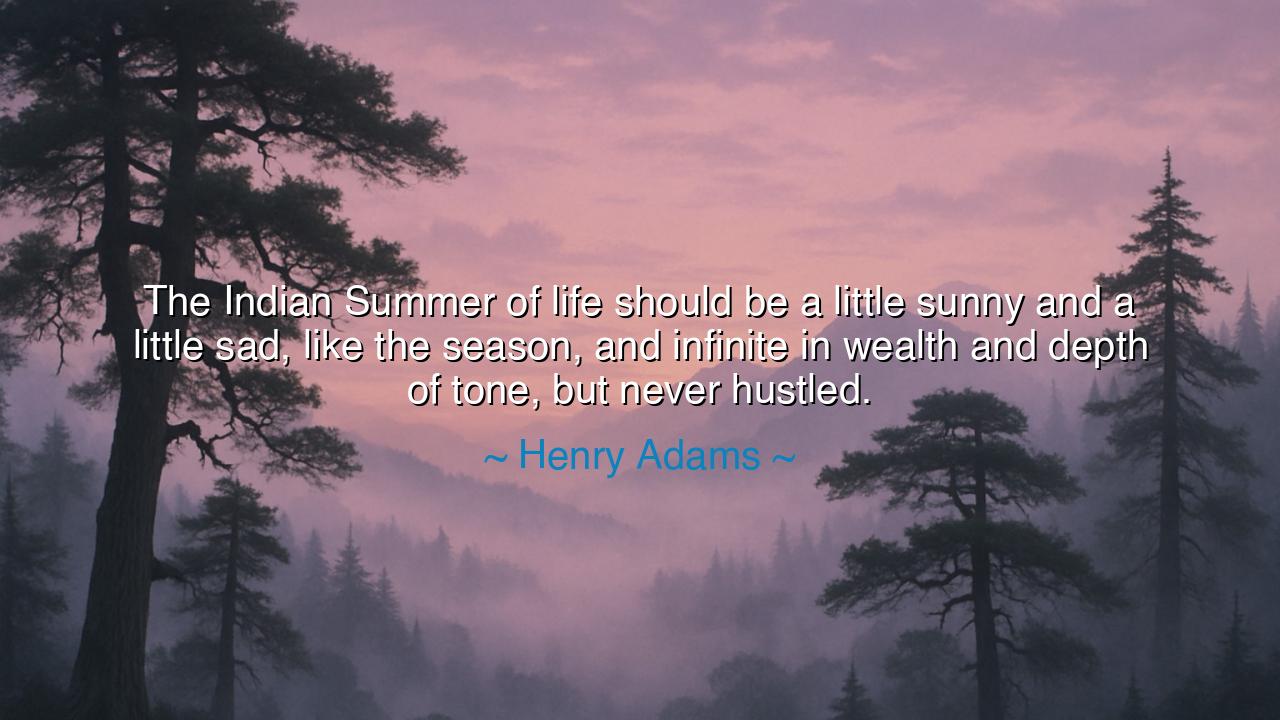
The Indian Summer of life should be a little sunny and a little
The Indian Summer of life should be a little sunny and a little sad, like the season, and infinite in wealth and depth of tone, but never hustled.






“The Indian Summer of life should be a little sunny and a little sad, like the season, and infinite in wealth and depth of tone, but never hustled.” – Henry Adams
In these words, Henry Adams, the philosopher-historian of a changing America, captures the quiet majesty of life’s late season — that twilight between vigor and decline which he calls the Indian Summer of life. To the young, the future burns bright and boundless, and to the old, memory becomes a field of echoes. But there is a sacred middle place, a time of ripening rather than rushing, when one learns to dwell between joy and melancholy with dignity and grace. Adams likens this to autumn — when the air is warm yet tender, when light softens but still glows upon the earth. Life, he says, should mirror this balance: rich, reflective, full of tone and texture, never hurried.
The Indian Summer — that brief return of warmth before the onset of winter — is nature’s last act of generosity. It is the earth’s deep exhale, the soft afterglow following the fire of youth. Adams, who came from a line of statesmen and scholars, wrote these words as one who had seen the rise and fall of nations, and the ebb of his own years. He understood that every life carries its seasons — and that the final ones should not be lived in haste or bitterness, but in acceptance and depth. The Indian Summer of the soul, he reminds us, is not an ending but a transformation — a time to gather the fruits of all that has been planted, and to savor them in quiet wonder.
In his words, there is the wisdom of the ancients. For the old philosophers, time was a teacher, not a thief. Seneca once wrote that life’s later years, if lived wisely, bring a peace that youth can never know. It is the peace of understanding — the kind that glows like sunlight through amber leaves. The sunny and sad tone Adams describes is not despair but serenity — the mingling of gratitude and grief that arises when one sees the beauty of impermanence. The wise do not fight the fading of summer; they walk gently into its gold, knowing that the warmth that remains is all the sweeter for its brevity.
Consider the story of Johann Sebastian Bach, who in his later years composed the Art of Fugue, a work so profound it seemed to rise beyond sound into eternity. By then, his sight was failing, his body weary. Yet his spirit was aflame with quiet light. He was no longer striving for fame or perfection — he was simply speaking the language of his soul, rich and infinite in tone, as Adams described. His music was not hurried, but deliberate, full of the weight of a life well-lived. It was the Indian Summer of his art — both joyful and sorrowful, serene and eternal.
In Adams’s phrase “but never hustled”, there is a rebuke to the restless heart of modern man. In youth, we chase; in age, we must learn to receive. The later years of life should not be spent in frenzy or fear, but in reflection, in gratitude for the harvest of experience. To hurry through them is to trample upon their sweetness. For just as the last days of autumn hold a richness unmatched by spring, so too does the mature spirit possess a depth that only time can give. Hustle is the language of the unripe soul; stillness is the song of the wise.
The lesson is this: when the Indian Summer of your life arrives — when the pace slows, when the leaves of your ambitions begin to fall — do not mourn. Sit instead in the sun’s last warmth. Cherish the calm that has come after the storms of striving. Speak softly, think deeply, love quietly. Let your laughter carry both light and shadow, for both belong to truth. In this way, your days will be rich not in motion but in meaning.
So live, as Henry Adams counseled, a little sunny and a little sad, not resisting the turning of your season, but welcoming it with grace. For there is no need to hurry when one has learned how to be still. The Indian Summer of life is not the fading of the fire — it is its transfiguration into light. Let it shine in you until the long winter comes, and even then, let it linger — soft, golden, and eternal in its wealth and depth of tone.






AAdministratorAdministrator
Welcome, honored guests. Please leave a comment, we will respond soon